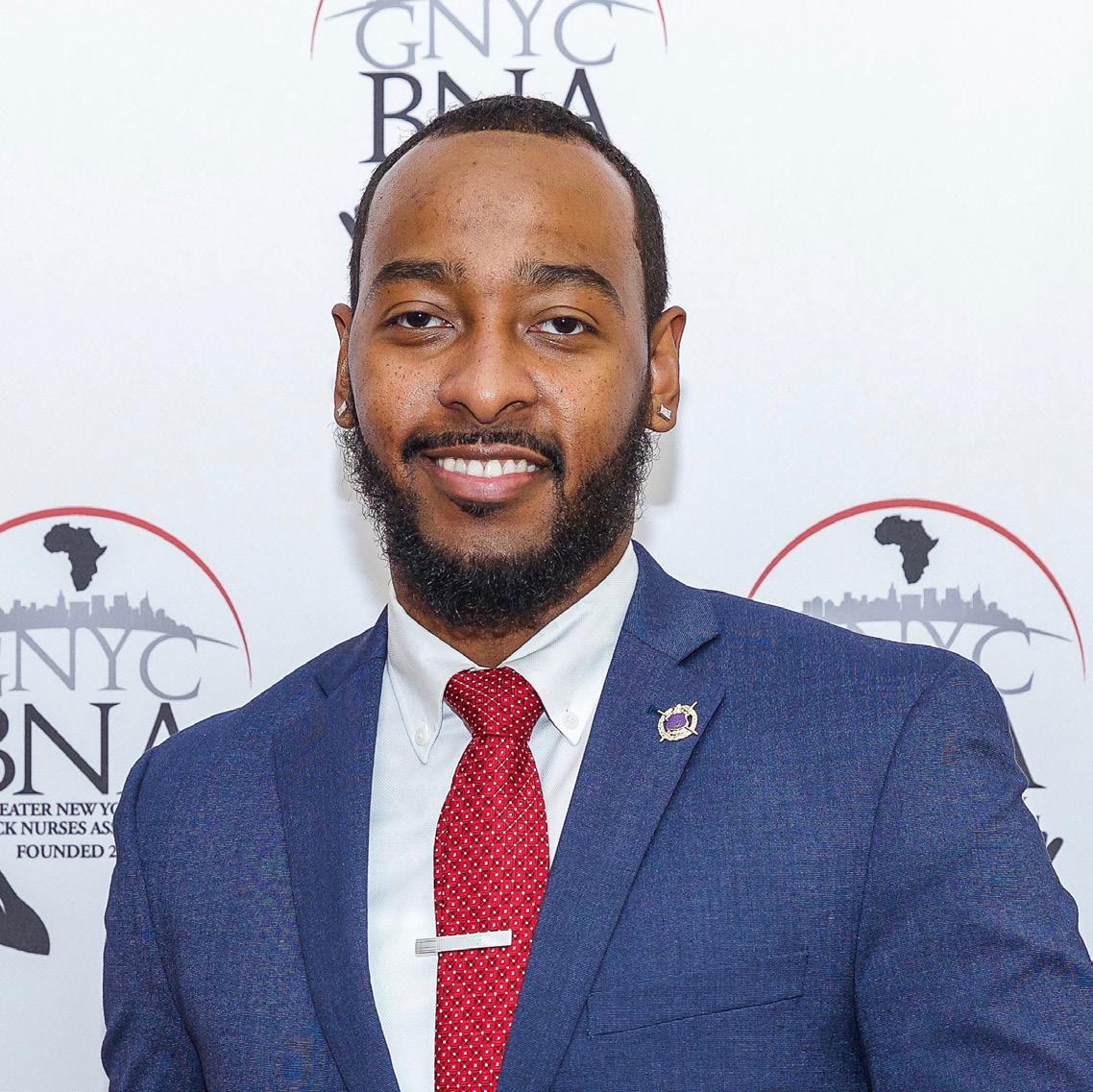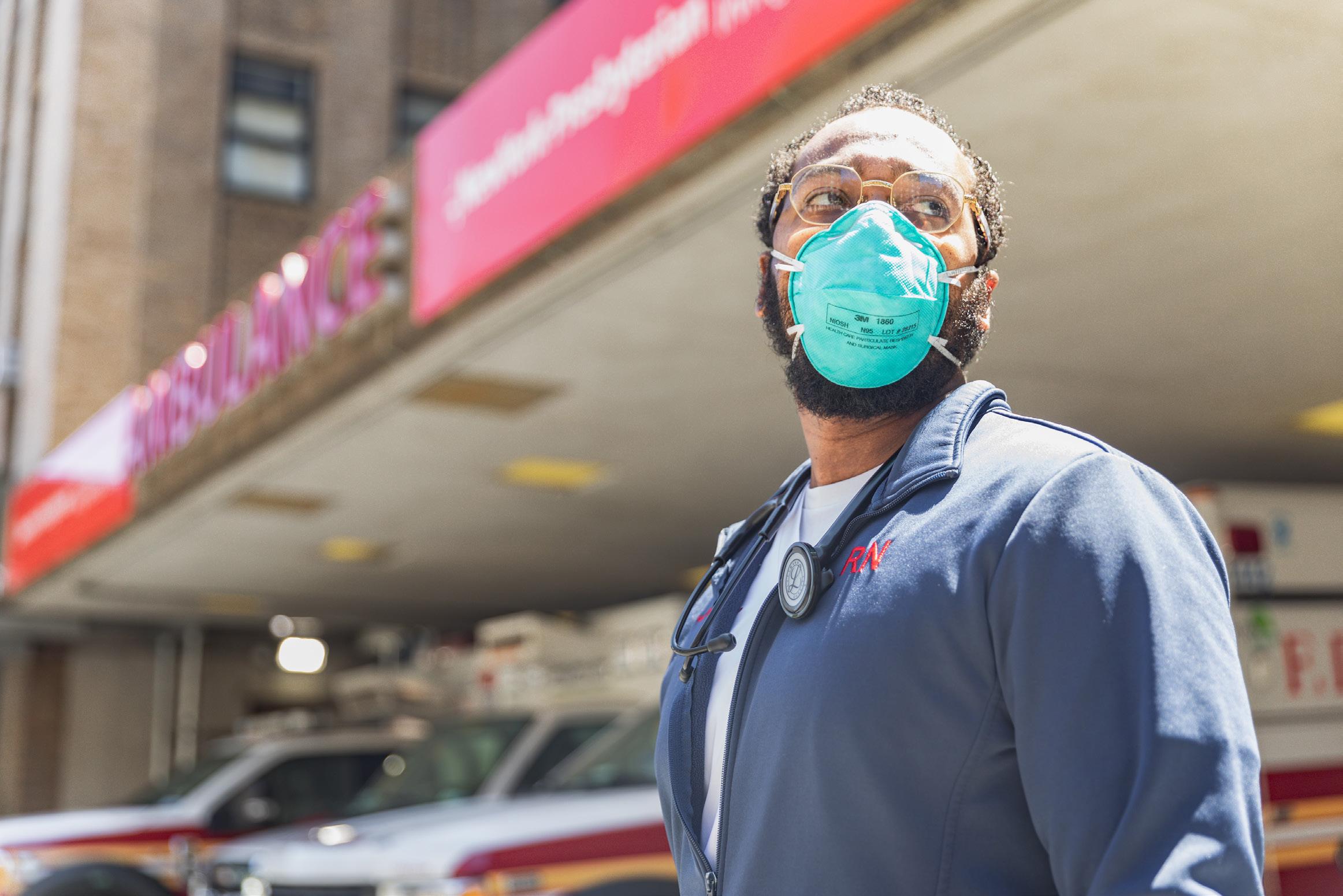
7 minute read
Health Care Hero
HEALTH CARE
UR Nursing grad surprised on live TV with $100K award in recognition of his selfless work on COVID front lines
Story by Ivy Burruto Photos by Steven Eloiseau
Jose Perpignan ’16N waited in front of his computer for an interview to begin one October morning, completely unaware he was moments away from winning a life-changing amount of money.
On live TV.
The popular morning show “Live with Kelly and Ryan” was holding a “Healthcare Hero $100K Giveaway” contest in collaboration with SoFi, a digital finance company, to recognize health care professionals for their work on the front lines during the pandemic. Perpignan knew his friend, Erika Hunt, had nominated him for the prize, but he thought producers were reaching out to clarify some of the information submitted about him.
Then the show’s executive producer, Michael Gelman, got on the line.
“Jose is that you? Can you hear me? Can you see me?” said Gelman, feigning a poor connection over Zoom.
“Yeah, I can hear you,” replied Jose.
“I’m having a little bit of a bad connection. Hold on for one second. Let me try to fix it.”
“Jose?” asked host Ryan Seacrest, “Hey, it’s Ryan and Kelly Ripa!”
“We just thought we’d let you know that you are the winner of our Healthcare Hero $100,000 giveaway!” Ripa said excitedly.
Surprised and nervous, Perpignan thanked the show, Erika, and family members who recognized his deep commitment to the nursing profession and the community.
“I don’t know what to say! I’m so grateful to have this help. It will put me in a space to focus more on my goals and giving back to the community, which is what I’ve dreamed of doing for a very long time. It means so much to my family, my kids, and all of my friends. We’re just so happy!” said Perpignan.
Recognizing that health care workers were among the hardest hit during the COVID-19 crisis, SoFi teamed up with “Live with Kelly and Ryan” to award $100,000 to one doctor, nurse, or physician assistant who has made a major difference in their community. Viewers were asked to submit


nominations, which were judged on many criteria, including the impact that the individual made during the pandemic.
Mitigating the Effects of COVID-19

Perpignan felt the sting of COVID-19 from the start. The pandemic put a halt to his full-time job at LiveOnNY, an organ transplant organization. To continue working full time, Perpignan picked up shifts as a care coordinator at the New York-Presbyterian Hospital’s cardiothoracic intensive care unit, which forced him to quarantine away from his family for 14 days.
In addition to working 12-hour shifts at the hospital, Perpignan coordinated with the Greater New York City Black Nurses Association (GNYCBNA) chapter he co-founded to prevent the virus from hitting his Bronx neighborhood. The group picked up seniors’ prescriptions and groceries and provided personal protective equipment (PPE) to those who couldn’t leave their homes.
Perpignan and members of the GNYCBNA also hosted virtual meetings with other Black Nurses Associations in the surrounding areas to share what to expect when the virus hit their hospitals. They discussed how to advocate for PPE, what politicians to contact for resources, and where to go for emotional support.
At New York-Presbyterian Hospital, Perpignan, like many nurses, was the last person some patients saw before they succumbed to the virus. He remembered one particular nurse who eventually tested positive for COVID-19 after he came out of retirement to work on the front line. Perpignan held up a tablet while the patient’s wife spoke her last words to her husband.
When thinking of those emotional moments, Perpignan said, “I try to be as genuine and authentic as possible with my patients and family members. I start with condolences to the family, and I always touch light on the positives that I know of this person. I’ll say, ‘He went out fighting, and I know he did that with his family in his heart.’ I tried to rewrite his ending, ‘He didn’t just die from COVID-19 in the ICU, but he died because he wanted to come back to fight. He’s a hero.’”
Perpignan explained that’s why he likes working at LiveOnNY, “If a 26-year old overdosed, I tell the parents their child didn’t just die from overdosing, they saved eight lives.”
Finding His Niche in Nursing
It’s this innate sense of optimism and positivity that helped Perpignan find his true calling as a caregiver.
A Brooklyn, NY, native, Perpignan grew up in a 39-story building as the oldest of 10 children. He decided on a career in caring when his father, an emergency medical technician, brought an ambulance to his school's career day in first grade.
Perpignan attended Binghamton University and graduated with a bachelor’s degree in Africana studies. During college, he shadowed a few physicians and fell in love with nursing, specifically the interactions between nurses and their patients and families.
After graduation, he spent several years working as a patient care technician before he was accepted into the University of Rochester School of Nursing’s Accelerated Program for Non-Nurses.
It was at the UR School of Nursing that Perpignan truly felt at home. He was thankful for the school’s holistic application review process, which identifies an applicant’s academic strengths, life experiences, and ethical character to determine their ability to contribute to a diverse learning environment and improve the health of individuals and communities. The UR School of Nursing saw Perpignan’s potential when other schools might have overlooked him.
As a student, Perpignan always went out of his way to learn the name of every student in his cohort, as well as the cohorts above and below him. He always admired Dean
Kathy Rideout, EdD, PPCNP-
BC, FNAP, for doing the same.
“Dean Rideout shaped my mindset on what leadership is. I remember walking by her in the
hallway and she said, ‘Oh, hey Jose!’ I was amazed. How can she work in the hospital, run a nursing school, and still know everyone’s name? I pride myself on becoming the type of leader Kathy is,” said Perpignan.
Beginning His DNP Journey
Starting in January, Perpignan will take the next step in his leadership journey, beginning the UR School of Nursing’s Post-Bachelor of Science to Doctor of Nursing Practice (DNP) program. The program is designed for nurses who wish to earn their DNP degree through an area of nurse practitioner or clinical nurse leader specialty.
Perpignan will return to Rochester in the spring of 2022 with his family to complete the clinical portion of the program. He looks forward to starting this next chapter with his wife and two children in a new home.
According to Perpignan, it was the GNYCBNA that prompted him to advance his nursing career. “A lot of the mentors within the organization have their doctorates. I’m the only one that’s on the board that doesn’t have a master’s or a doctorate. The exposure of being around them opened my eyes to the resources, access, education, and plans they have. That’s what I want,” he said.
Perpignan shared his plans after he completes the program, “I want to go into education. I’m leaning more toward a clinical professor because I’m more of a hands-on, tactile learner. It’s easier for me to explain things that I’ve experienced.“
“When I was in my clinical, all of my preceptors were amazing and had so much knowledge. They still had to connect the didactic aspect of it, and if that wasn’t their strength then their strength was bedside, and I know that’s mine too. I can transfer that communication and information from the bedside to the students,” he said.
Perpignan even dreams of opening a practice geared toward underserved communities. He wants to promote health and opportunity for young kids that came from neighborhoods like his, who may have never seen a nurse, let alone a male nurse. “I want to provide a platform for them as a mentor to push them in that direction, even if it’s not in nursing, but toward education in general.”

Jose Perpignan ’16N felt the sting of COVID-19 from the start, losing his full-time job at LiveOnNY, an organ transplant organization in New York City. In response, Perpignan threw himself into serving his community in other ways, including working 12-hour shifts at New York-Presbyterian Hospital’s cardiothoracic intensive care unit.






